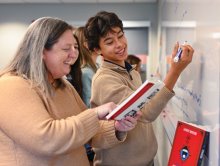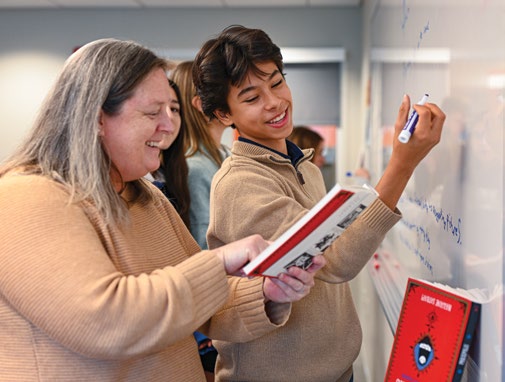
As generations of alumni have returned to campus this fall, they have shared their stories of how their experiences at Country Day inspired them to pursue careers in the White House, medical research, the military, corporate leadership, and investigative journalism. And while we encourage our current students’ efforts to push new boundaries of research and performance in the arts, mathematics, literature, and computer science, the core challenges that have always shaped a GCDS education continue to drive every student’s learning: How to think about complex problems, how to channel this thinking into cogent communication, and how to leverage these skills toward the benefit of others.
Strengthening Writing + Research
As they start their journey in the Upper School, ninth graders are keenly focused on these two goals. Building on their experiences in the Middle School, ninth graders begin their path through the Upper School, guided by a talented team of interdisciplinary faculty. These teachers challenge students to connect ideas across their classes, to engage with different perspectives, and to apply their learning to the pressing issues and questions that define a dynamic world.
The structure of the ninth grade program supports this approach, with a core teaching team of Biology, English, and History faculty who guide shared cohorts of students.
“In ninth grade, students set out to meet more rigorous requirements within a comprehensive experience that is purposefully crafted by caring faculty,” says Devika Bodas, Ninth Grade Academic Program Co-Coordinator and Biology and Neuroscience teacher. “In this challenging work, they find meaning and make connections between their classes while building a collaborative academic community. We notice that this yields a solid foundation and culture of curiosity for the next four years of Upper School.”
As ninth graders gain their stride in October, students are assigned simultaneous writing projects in their classes—an analysis of climate change in Biology, a literary analysis of the novel Lord of the Flies in English, and historical research assessing the triggers of decline in ancient civilizations—all challenge students to think about systems of societal and environmental organization.
In individual classes, faculty guide students to build their skills and to gain an understanding of the process and mechanics of discipline-specific writing. How do you frame a hypothesis in scientific research? What does cogent analysis of a literary passage look like? How do you weave together changes over different historical movements?
“We work with students intensively to build these foundational skills in every discipline, which will be crucial as they navigate our research and Advanced Applied programs, and ultimately prepare for university programs later down the road,” says Shannon Hubertus, Biology teacher and Science Department Head.
Making Connections
As ninth graders adapt to the rigor and intellectual maturity of the Upper School program, their teachers also prepare them for an equally crucial skillset: connecting their learning across their classes. The faculty team matches significant challenge with personalized mentorship and support of learning. Meeting every morning before school, the Ninth Grade Team discusses individual student progress and assesses the trends and opportunities that they see across classrooms.
“Having a faculty team that cares first and foremost about each individual student’s engagement and growth—this makes the ambitions and challenge of the program possible,” says Lizzy Giffen, Ninth Grade Academic Co-Coordinator and English teacher. “The teaching team models collaboration and curiosity, and the students watch and learn from this genuine enjoyment and engagement.”
And this close collaboration among teachers translates directly to cross-disciplinary learning for students. Utilizing weekly full grade meeting times and combining adjacent class periods, the Ninth Grade faculty collaborate on a program to guide students to study their own writing, as well as the approaches of their peers, across their classes. This work centers on three related lenses of analysis:
Exploring Language + Structure:
Students compare related structures of research and analysis across different disciplines. What is the relationship between a scientific hypothesis, an analytical claim in English, and an historical research thesis? How do the language and conventions of these fields overlap? With which methods do I feel stronger as a writer?
Exploring Audience + Purpose:
Students analyze examples of their own work, as well as the work of professional experts in different fields, to think about the connections between discipline-specific writing structures and the intended audiences and priorities for that discipline. What is important to a scientist? What is the purpose of social scientific argument? How does literature connect with lived experience?
Connecting Approaches:
Finally, the faculty guide each individual student to distill their writing and research styles across their classes. How can a student’s strength in historical research inform their growth in scientific methodology? How might a student channel their ability to connect with the characters of a novel to bolster their investigation of an historical artifact? And, through analyzing the work of their peers, students learn how to give and receive effective feedback for written arguments. How do you translate someone else’s perspectives into reflection on your own work?
Cultivating an individual voice, as well as an expansive and effective lens through which to analyze the surrounding world, is the crucial goal of a foundational education. At GCDS, we have leveraged a legacy of strong and dynamic approaches to education to constantly reassess our efforts to prepare students to lead in a rapidly changing world. In learning to collaborate effectively, to question intensively, and to analyze and argue cogently, our ninth graders work to build their strengths as individuals, and to strengthen the communities around them.
“I learned that I like writing a thesis-based argument. I’ve started thinking about how to use that to strengthen my approaches in science and in English.” —James Bilden ’28
"It was so interesting to see my classmates’ processes and thinking and how they expressed their arguments. This gave me completely new perspectives on the questions I was asking.” —Rapha Jacobson ’28











.JPG&command_2=resize&height_2=85)





.jpg&command_2=resize&height_2=85)




